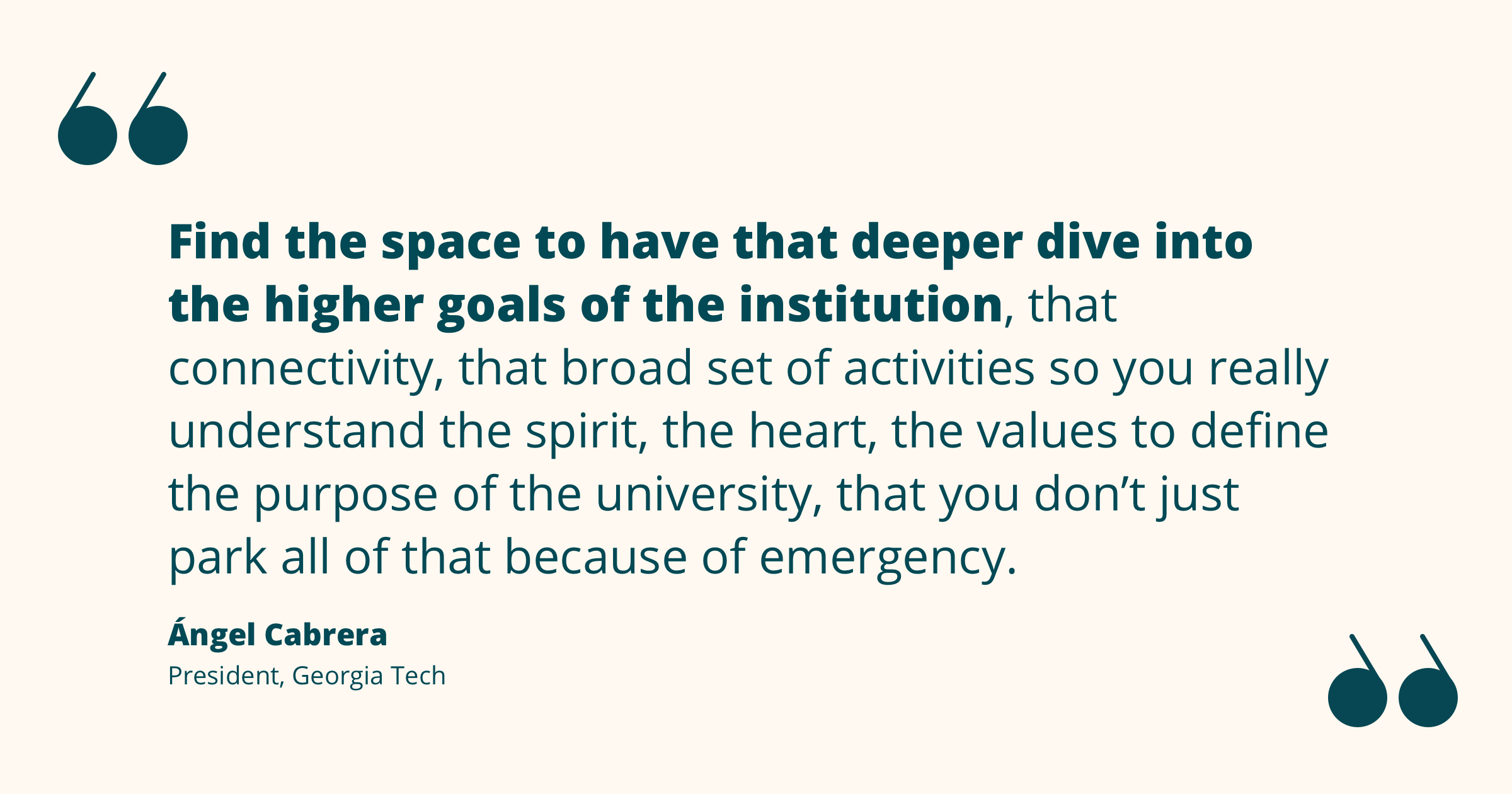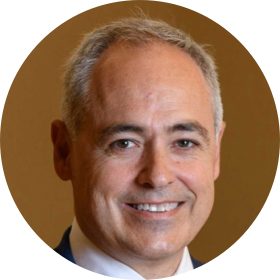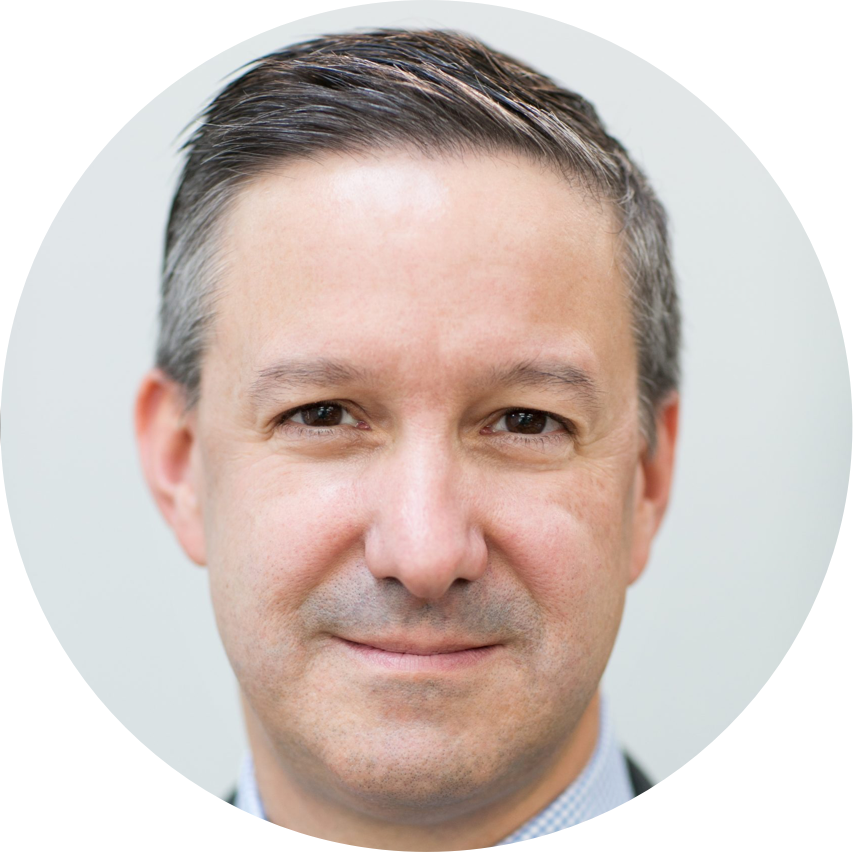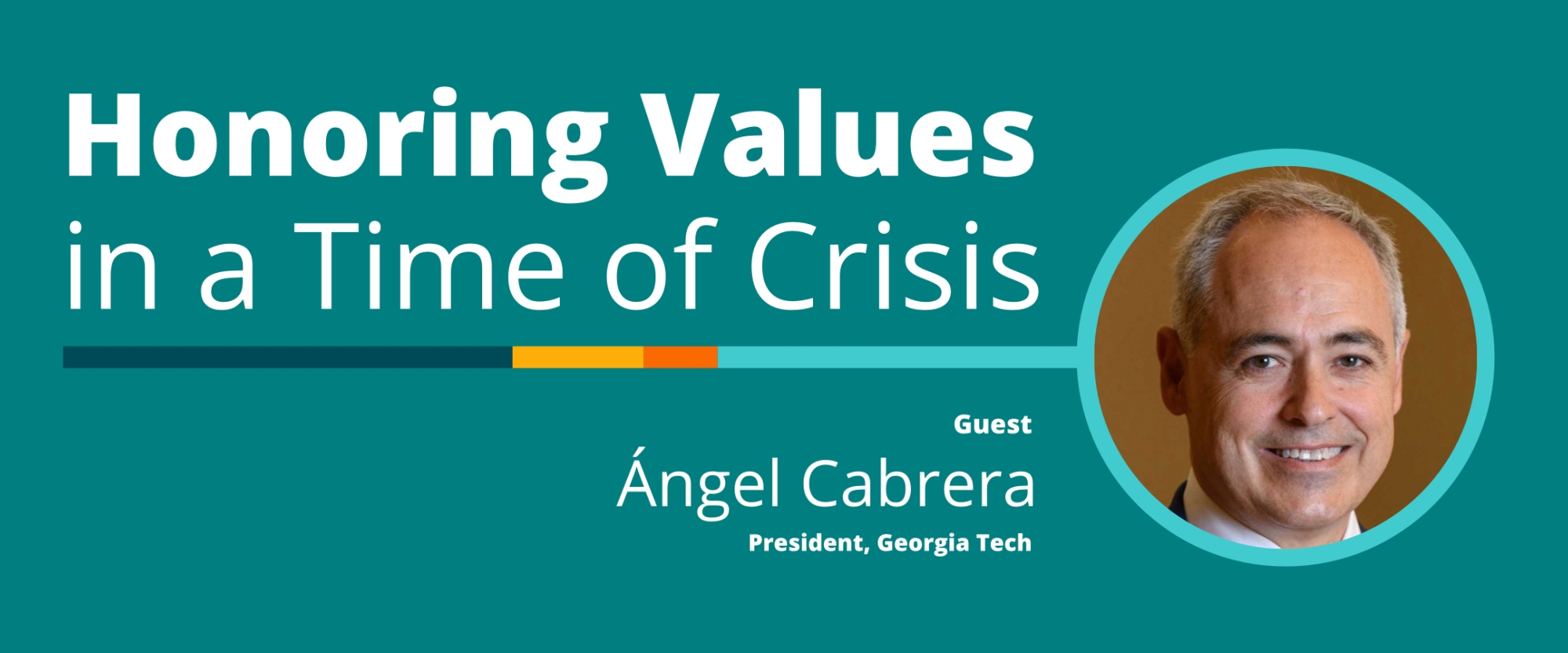Note: This interview, Episode 7 of the Weekly Wisdom Series, originally aired on June 1, 2020 as part of the University Innovation Alliance’s Innovating Together podcast, appearing live on Facebook, Twitter, and LinkedIn.
The University Innovation Alliance (UIA) is proud to present Innovating Together, a weekly podcast developed in partnership with Inside Higher Ed. I'm Executive Director of the UIA, and my podcast co-host is Jeff Selingo, author, journalist, and special advisor at Arizona State University. For our seventh conversation in the podcast's Weekly Wisdom series, we spoke with Dr. Ángel Cabrera, who was then a first-year president at Georgia Institute of Technology. While he'd only spent nine months at Georgia Tech at the time of our conversation, President Cabrera has a long history of leadership in higher ed, and he was able to offer us the unique wisdom of someone who was both a seasoned veteran yet new to this particular role. We appreciated his thoughtful comments about handling the COVID-19 pandemic as well as the larger responsibilities faced by colleges and universities.
A Responsibility for Equal Opportunity
When we spoke with President Cabrera, it had been less than a week since the death of George Floyd in Minneapolis, and equity in higher ed was very much on his mind. "We as universities have an absolute crucial mission to provide opportunity to be one of the biggest instruments we have of social mobility," he told us. "And we have to think about what each of us and each of our institutions can do to really deliver on that promise of equal opportunity, of inclusion, or of a much more just world." He noted that, while Georgia Tech is attracting applicants worldwide, "we don’t do as well as we should do in terms of the number of African Americans. We are in the middle of a city with a majority Black population, and our undergraduate African American numbers barely reach seven percent. I think we’re right to hold our universities accountable for that. We really have a responsibility to be thinking about what is it that we can do and we must do to deliver on that mission of equal opportunity."
Leadership in Times of Crisis
As someone who's served in academic leadership positions for 15 years, President Cabrera offers a framework for approaching crises such as a national outcry for social justice – or the COVID-19 pandemic. "It does take time to build up your own conception of leadership and find yourself in a complex organizational setting like universities are," he observed. "And one of the most important things I have learned is that it is far more important to set up the sense of direction and a sense of grounding on the use of values of an institution." Those who make the decisions need to project "a shared sense of where we’re going and what it is that we’re trying to accomplish."
President Cabrera suggested, "We’re teachers and military commanders in a way, and hopefully we’ll make informed and wise decisions." He offered this example: "In the situation we’re in right now, which we’re going through as a nation, through this very, very tiring and painful process of digesting the killing of George Floyd and the many other injustices before his, you say, 'Why, what does that have to do with universities who are discussing early work?' A lot. It highlights our mission, our values, our commitments to equity and access, and I think emphasizing and underlining that sense of direction is probably one of the most important things I should be looking at right now."
Planning and Impact
When President Cabrera assumed leadership of Georgia Tech for the 2019-20 academic year, he recognized his duty to begin a new cycle of strategic thinking and planning. "We split it in two phases," he said. "One was let’s agree on the vision. Let’s even rewrite our mission statement, a vision of the future we want to build, a set of values, a set of themes we want to work on. And then the second phase is let’s translate that into an actionable plan with metrics, with objectives. We used a very inclusive approach for that first phase, a series of appreciative inquiry sessions. I challenged us to have hundreds of people participating in these sessions, and we ended up having actually thousands of people participate. And then COVID hit."
While the pandemic delayed the second phase of strategic planning, President Cabrera told us, "What it also did is it offered a natural – painful but natural – test of whether our vision was going in the right direction. I think we passed that test well. Our mission and our new vision is one of increasing innovation that brings all voices, all profiles to the table, and impact innovation that really contributes to improving the human condition. And as COVID was hitting us, we saw incredible examples of our faculty and graduate students using their research to make a difference in the fight against the pandemic, and showing what real impact was about in real time. Whether it was projecting and modeling the trends of the pandemic. Whether it was designing respirators or personal protective devices or participating in the development of assessments, testing vaccines and antiviral treatments and the like. This has helped us even sharpen the focus and highlight some of the elements of that vision." Beneficial as this was, he added, "I don’t wish this upon anybody to have to have that kind of testing of your planning process."
Advice for New Leaders in the Time of COVID
Because of President Cabrera's extensive experience, we asked what advice he might have for incoming college presidents and chancellors. "I still have a lot to learn," he admitted, reminding us that he was only in his first year at Georgia Tech, "but definitely I’m fortunate that I bring some years behind. I have colleagues who just started their first top leadership position in academia, and I spend time on the phone with them, and I feel for them." He also considers himself lucky that he had a few months to find his way before the pandemic changed everything.
For those who have to hit the ground running, he offered this: "Even though you will have to jump in the situation where you’re going to have emergency task forces and emergency decisions and you’re going to have to turn on a dime in the next few weeks, somehow you find the space to have that deeper dive into the higher goals of the institution, that connectivity, that broad set of activities so you really understand the spirit, the heart, the values to define the purpose of the university, that you don’t just park all of that because of emergency. That part is going to be essential; it’s going to be defining for your presidency; it’s going to be the most important thing that you to do for your university."

Bringing Out the Best
When we asked President Cabrera what keeps him hopeful during such distressing times, he spoke proudly of the how everyone at Georgia Tech stepped up to meet the crisis. "I look at the endless examples of leadership, of ingenuity, of commitment by our students and by our faculty," he said. "In the early days of the pandemic, we'd see our faculty members go back to their labs, to remake their spaces with students, designing products, and everybody asking themselves, 'How does my expertise matter in this moment? What is it that I can offer?' We have seen so many examples. When we had to go online and remote, everybody – the students and the faculty – did what they had to do. I know these situations created a lot of angst and pain and ambiguity and uncertainty, but they also bring out the best in people, and there have been so many constant reminders of why the mission of our institutions of higher education matters so much that I think we’ve had plenty of ammunition to keep us all going – and going strong."
Links Mentioned in This Episode
• Georgia Institute of Technology
• Death of George Floyd (as reported in TIME magazine)
• Impact innovation (referring to Georgia Tech's innovation ecosystem)
Bios of Guest and Co-Hosts

Guest: Ángel Cabrera, President, Georgia Institute of Technology
Dr. Ángel Cabrera is the 12th president of the Georgia Institute of Technology, assuming office in September 2019. He previously served for seven years as president of George Mason University which, under his leadership, accounted for over half of all higher ed enrollment growth in Virginia; increased student outcomes; joined the top tier of research universities in the Carnegie Classification; expanded online programs and international recruitment; built several new facilities; and more than doubled receipts in philanthropic contributions. From 2004 to 2012, Dr. Cabrera was president at Thunderbird School of Global Management (now part of Arizona State University), making him the first native of Spain to serve as president of an American university. Prior to 2004, he was dean of I.E. Business School in Madrid. As a business educator, he has played a key role in advancing professional ethics, internationalization, and corporate social responsibility. He was the lead author of the 2007 Principles for Responsible Management Education initiative by the United Nations Global Compact. His research has been published in leading academic journals; he has been quoted by leading global media; and his op-ed pieces have been published internationally. He was named a Young Global Leader by the World Economic Forum, a Star of Europe by Businessweek, Henry Crown Fellow by the Aspen Institute, and Great Immigrant by the Carnegie Corporation of New York. He has received honorary degrees from Miami Dade College and Universidad Politécnica of Madrid. For most of the past decade, he has served on the Georgia Tech Advisory Board, including a stint as its chair. Dr. Cabrera earned his M.S. and Ph.D. in cognitive psychology from Georgia Tech, which he attended as a Fulbright Scholar. He also holds a telecommunications engineering degree (B.S. and M.S. in computer and electrical engineering) from Universidad Politécnica de Madrid.

Co-Host: Bridget Burns, Executive Director, University Innovation Alliance
Dr. Bridget Burns is the founding Executive Director of the University Innovation Alliance (UIA). For the past decade, she has advised university presidents, system chancellors, and state and federal policy leaders on strategies to expand access to higher education, address costs, and promote completion for students of all backgrounds. The UIA was developed during Bridget’s tenure as an American Council on Education (A.C.E.) Fellowship at Arizona State University. She held multiple roles within the Oregon University System, including serving as Chief of Staff and Senior Policy Advisor, where she won the national award for innovation in higher education government relations. She was a National Associate for the National Center for Public Policy and Higher Education, and has served on several statewide governing boards including ones governing higher education institutions, financial aid policy, and policy areas impacting children and families.

Co-Host: Jeff Selingo, author, journalist, special advisor at Arizona State University
Jeff Selingo is an author, a journalist, and a special advisor at Arizona State University. He has written about higher education for more than two decades and is a New York Times bestselling author of three books. His latest book, Who Gets In & Why: A Year Inside College Admissions, was published in September 2020 and was named an Editors’ Choice by the New York Times Book Review. A regular contributor to The Atlantic, Jeff is a special advisor for innovation and professor of practice at Arizona State University. He also co-hosts the podcast, FutureU. He lives in Washington, D.C. with his family.
About Weekly Wisdom
Weekly Wisdom is an event series that happens live on Facebook, Twitter, and LinkedIn. It also becomes a podcast episode. Every week, we join forces with Inside Higher Ed and talk with a sitting college president or chancellor about how they're specifically navigating the challenges of this moment. These conversations will be filled with practicable things you can do right now by unpacking how and why college leaders are making decisions within higher education. Hopefully, these episodes will also leave you with a sense of optimism and a bit of inspiration.
Rate, Review & Subscribe
Learn why hundreds of people have rated this new podcast 5 stars! Please join others and rate and review this podcast. This helps us reach and inform more people -- like you -- to help increase the number and diversity of college graduates in the United States.
Click here, scroll to the bottom, tap to rate with five stars, and select “Write a Review.” Then be sure to let us know what you loved most about the episode! Also, if you haven’t done so already, subscribe to the podcast. We’ll be adding a bunch of bonus episodes to the feed and, if you’re not subscribed, there’s a good chance you’ll miss out.

